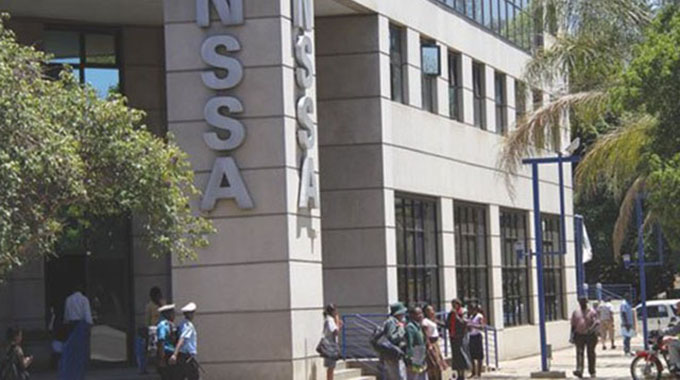EDITORIAL COMMENT: We must sort out NSSA quickly, permanently

The National Social Security Authority has been under near continuous investigation for several years now as anti-corruption agencies and Government dig into audit reports and are given information by whistle-blowers, which may be accurate or may be malicious or may simply be mistaken.
Yet NSSA should be, and could easily be, one of the best run parastatals in Zimbabwe since so much of its work has to be done in the open where everyone can see it.
Basically the authority runs an accident insurance scheme for workers and companies in the formal sector, its oldest business, and a basic survival pension scheme, again for workers in the formal sector. Both schemes see large sums coming into NSSA each month collected by employers from their own workers and then topped up, basically doubled, by the employers before being passed on to NSSA.
NSSA is supposed to be investing these funds so as to build up the value of the sums invested, and at least preserving them from any loss through inflation, and then from the revenue derived from investments paying the disability and old-age pensions.
It is a very clear business model and there are several companies in the private sector, two of them very large with huge investment portfolios, doing the same thing.
Because these very long term insurance schemes need investments that can produce revenue while growing, and which can be largely proofed against inflation, most of their investments are in property and equities, with minimal churning of the portfolios and the investors settling down for the long haul.
The scale of the business can be seen when you realise that someone starting work at 21, and making their first payment into NSSA or a private scheme, may retire at 65, that is 44 years later and switch from a contributor to a recipient, but still be around when they are 91.
So NSSA, or anyone else in the pension business, has to be investing that first payment made at 21 so that 70 years later the rent or dividend income from the investment are still there and being paid out.
And those pensions need to retain value, even if there is inflation, so the investments need to be inflation-proofed as much as possible. Such schemes also tend to be cash rich, with the monthly subscriptions pouring in, especially when populations and workforces are growing, so there are more people paying in than are receiving their pensions.
But that monthly pool of cash is not money there to be spent, but money to be invested and when we are in any environment that has more than negligible inflation needs to be invested rather rapidly.
This means there needs to be an investment strategy, that as cash flows in the strategy directs it into the new investments being built up. So if the latest investment is a couple of large buildings the cash is immediately used to pay the bills for the continuing work, so ephemeral cash is turned into long lasting concrete.
Sometimes the investments are not as good as was thought, and sometimes there are major economic and social changes.
For example Old Mutual, First Mutual, other insurers and pension funds built up large portfolios of office buildings in central Harare. Then many corporates renting this space wanted to move into the suburbs.
The market was not destroyed, and the commercial property on the lower floors still pulled in reasonable rents, but obviously new office complexes needed to be elsewhere.
The long-term investment concerns are adjusting and have come up with a number of schemes that require some alteration of planning rules, but which still generate returns from their investments to pay those pensions tomorrow that the pensioner was contributing to when the buildings were erected.
From the sort of information that is flowing out of NSSA it appears that this long term planning strategy is weak, that the investments that need to be made when say this month’s money flows in from the employers were not set several months ago.
The second problem is that as these large pools of cash are created, there is a temptation to spend some of it, instead of investing the lot. So we have the board flown to Kenya for a workshop that could have been run in Zimbabwe at far lower costs.
Yes, the money was there, but it was the pensioners’ money, not really NSSA money.
A general problem in the public sector investment parastatals and authorities is keeping administration costs as a low percentage of the revenue. We once had Zinara, the roads authority, spending a ridiculously high percentage of its licence fees and tolls on administration, until the Government stepped in and started enforcing the low percentages permitted in the legislation that set the authority up.
Zimra has always, right back when it was a couple of departments in the Ministry of Finance, been very careful in its annual reports to state how much it spent collecting the taxes.
And successive commissioners knew that while they had to collect taxes, only a tiny percentage of these could be spent on collection since the main point of tax is to run the Government and fund its programmes, not fund tax collectors.
NSSA, as a public entity, is under some pressure to make investments that benefit communities and the nation.
This is fair enough since its money comes from people in those communities and since all staff in the formal private sector have to contribute, by law, it covers a large block of the nation.
So contributors can get a double benefit, some decent facility now and a pension later on.
The investments, of course, like all investments have to be producing inflation-proofed revenue, but with some careful thought this is possible.
But we need to stop this process that NSSA has to be continuously investigated, rather than being sorted out once and for all, and then just producing annual audit reports that show it is an exceptionally well-managed authority able to pay inflation-proofed pensions and even that the odd thief is in jail by the time the report comes out.
So the main task now is to complete the investigations and simply fix the authority so it can fulfil its mandate properly and have an investment vision that makes sense and can be kept active.










Comments